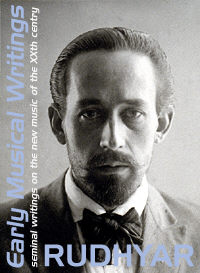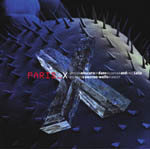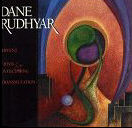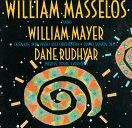 |
| Home | Bio | Art | Music | Literature | Civilization & Culture | Philosophy of Wholeness | Theosophy & Spirituality | Astrology |

MUSICAL FASCISM
D. Rudhyar Publication History Unknown January 1922 During the 1920s, Rudhyar was one of the most acticulate and outspoken critics of "Neo-Classicism", a movement among composers to return to pre-Romantic, European musical ideals and forms. In this article, Rudhyar's first on the subject, Rudhyar draws parallels between musical and political movements, referring to Neo-Classicism as Musical Fascism. Neo-Classicism was a powerful movement lead by Stravinsky, Casella, Milhaud and others. It was a reaction against the confusing and, at times, anarchistic, aspects of the new and experimental music being composed during the 1920s, especially to the music, of the "Ultra-Moderns", a small group of composers which included Edgard Varèse, Dane Rudhyar, Charles Seeger, Carl Ruggles and Henry Cowell. Rudhyar became their chief spokesman and contribute more literature to the new music of the 1920s than any other composer. In the course of his writings during the 1920s, Rudhyar pointed out that many composers who once proclaimed the virtures of the new music of the XXth Century soon retreated to safer ground, becoming ardent supporters of "Neo-Classicsm." Significantly, Rudhyar suggests that Stravinsky "flip-flapped" because he was intensely fighten by the power he had released in "Sacre du Printemps", and that Stravinsky even took ill for serveral days immediately after its premiere preformance. Neo-Classicism soon gained control of the musical world, being accepted as a sort of "offical" music by the musical establishment, resulting in a lose of funding and academic acceptance for the Ultra-Moderns who opposed it. As the spokesman of the Ultra-Moderns, and the author of the most skillful and powerful criticism of Neo-Classicism, the ascension of Neo-Classicism brought ruin for Rudhyar's musical career. The Early Musical Writings of Dane Rudhyar are made available for students of musical history and for scholarly research. Rudhyar was concerned that composers, students and scholars should not regard his earliest writings and articles - written while he was still a young man - as his most significant literary contributions to music. The reader is referred to Rudhyar's book The Magic of Tone and the articles The Transforming Power of Tone and When Does Sound Become Music for his mature and fully developed contributions. |
|
Related Articles |
|
Archived Music Articles |
|
|
Also Available Online |
|
» Rudhyar's Integration of Experience and Concepts - Music, from Leyla Raël's The Essential Rudhyar. |
|
Available Offsite |
|
Musical Works |
|
Musical Scores |
|
For scores of Rudhyar's musical works, visit the site of the American Composers Alliance. Musical scores 5 Stanzas and Granites are also available from SheetMusicPlus.com |
|
Also of Interest |

The Music of Rudhyar & Satie PARIS-X Musica Obscura Richard Cameron-Wolfe, Piano. Hear a sound clip 
Piano and String Compositions AVENT, CRISIS & OVERCOMING, TRANSMUTATIONS Marcia Mikulak, Piano and The Kronos Quartet 
An Earlier Recording of Rudhyar's Music Now on CD MASSELOS PLAYS RUDHYAR |
|
Home » Music » Articles on Music Nothing is more interesting to the artist who is deeply touched by everything human in all realms of life than watch how closely the evolution of Art moulds itself upon the social, inter-human evolution. Consider music, how it has evolved during these last centuries. The musical works which have been produced mirror faithfully the outstanding features of the complex history of the period. If we go back far enough, we find that the establishment of the modes upon which western music rests, or more exactly the fixation of the "tonal" concept, dates from about the tenth century, not very long afterwards brought to the medieval world the idea of world-imperialism, and idea which has dominated the history of Europe ever since, embodying itself successively in all nations, especially in the French and Teutonic races. The conception of "tonality" which was evolved then is really a sort of musical imperialism, which became more conspicuous and autocratic after the time of the world-imperialism of the Austrian Empire, when the "major mode" rose slowly to omnipotence and absorbed all the other modes. The autocracy of the system grew worse when "mean temperament" was definitively accepted at the time of Bach, which is also the time of Frederic II, the founder of the Prussian domination. The Prussian victory of 1871 produced a Strauss, father of the atonal duodecuple system, which was pushed to its extreme consequences by Schöenberg. Atonalism is as much a result of tonalism, as anarchy is the outcome of a wrong social order. On the other hand, defeated Germany gave birth to Beethoven, the breaker of the old classical limitations; defeated France evolved Berlioz, the founder of musical romanticism; dismembered Poland, oppressed Hungary, produced Chopin and Liszt. Debussy, the iconoclast, preparing the ground for the music of the future, came after 1870. Whenever imperialism triumphs, the Western intellectual, unnatural conception of tonality dominates unquestioned. Whenever it is broken musical freedom slowly asserts itself. The arrogantly imperialistic France of today had to produce a Darius Milhaud and his group. Debussy and Ms modal freedom is despised under a mask of polite esteem, and a new system which combines in a masterly way all the evils of both tonalism and atonalism ha evolved. Such a system is what I call " Musical Fascism". Fascism is not only an Italian phenomenon; it is an international symptom. It is a reaction against misunderstood, misapplied and incomplete communism. So are the "Six" a reaction against Debussy, chauvinism a reaction against the national apathy of the Parisian society before the war. French music in Paris, anxious not to be untrue to the nationalistic madness of the country, went ahead and leads musical reaction today. Curiously enough it does it while being outwardly very "progressive" in its technic. But the outer varnish of unnecessary dissonances is nothing but a clever camouflage which thinly masks the diatonic skeleton of the works. Arthur Honegger's "Pastorale d'Eté" reveals the camouflage by showing the naked body of the French inspiration, a "Pastorale" quite inspiring for those musicians who are still longing for the time of Beethoven's Pastoral and of Liszt's First "Annees de Pélérinage". It was written 3 years (so did I hear) and being performed at the first orchestral concert sponsored by Milhaud, must appear to him as a truly representative work. Milhaud's system of harmonization seems to be the tonalization of atonalism. His dissonances are systematic, not natural. He does not consider the twelve notes of the scales as the synthetic expression of major and minor modalities; but starts from the atonal duodecuple system and tonalizes it afterward; which is the systematization of artificiality, legalized anarchy. This may be proven by the fact that he never forgets ending his compositions by some lovely diatonic scale. If you miss it at the end, search for it somewhere in the middle, but you must have it. Probably Milhaud takes the major scale as his battle-cry. It symbolizes perhaps the resurrection of the dead. But let us quote his written words: "One of the purpose of the younger French composers is to preserve the older and more perfect musical forms. We have gone back to the eighteenth Century for our patterns". Mozart and Mendelssohn are named as models and he assures us that he is "not striving to do away with the established order of things". How characteristic these words are of the modern, governmental French spirit! France is "going back" to the imperialism of Louis XVI; and musicians who are proud of being French follow. They have followed their politicians in cutting the musical world in two — Latin and Teutonic. (Where are the Russians? all dead?). But strange to say, Milhaud who first said that he was going back to the forms of Mozart and Mendelssohn — who apparently were Teutons — continues by making the fantastic claim that he has nothing to do with Teutonic music, and that he is an heir to the Latin composers? Rameau (the apostle of natural harmony!), Berlioz (the iconoclast, the tonality-breaker!), Debussy (the great lover of freedom and nature!). An amusing parallel between Bizet and Wagner reveals that in spite of his chauvinism Milhaud condescends to read Nietzsche ! He does not see apparently that he contradicts himself constantly. His music Is, in a way, a perpetual contradiction, being both essentially tonal and essentially dissonant. The European world is indeed full of contradictions today Be it as it may, the spectacle of this group of French composers is a sad one for whomsoever loves the truly progressive life, and is trying to feel the great pulse of humanity as it vibrates toward a deeper and more intrinsically realization of the essence of a conscious, free, sincere and spontaneous Manhood and womanhood, toward universal compassion and international brotherhood. The music of Milhaud and of his friends is a denial of the dearest aspirations, of the most vibrant hopes, which a Scriabin, for instance, had roused. It "goes back" to Mozart and Mendelssohn — what more to say! It is cold, heartless, superficial, artificial, unmoving, chauvinistic. We must recognize that it is supremely clever, well made, well orchestrated; that it generates new and striking effects, that its technic is masterly. But it is dead, spiritually, ethically, emotionally. Oh! when will men begin to appear in the world of Music, and chase away from its temple the trafflcants in notes, the technicians? When will the technic-mad Europe be disintegrated? When one thinks of the marvelous spontaneity, of the deep human longing vibrating in the real tangos, of the beautiful soul of the pampas singing in their passionate melodies, to hear the sort of brutal war-machine that Milhaud makes out of their rhythms is something too. We do not glorify immeasurably Debussy today, yet what a great artist he was compared to his self-styled successors! Any single page of the "Martyre de Saint-Sebastien " contains more true musical and human inspiration that all the works of the Six put together, at least those which I have read and heard. These French musicians, which are nothing but French, are worshipping the golden calf of Form. They are afraid to be revolutionary. So let it be but they do not see that the material which they use for their formal construction is dead. They work with the dead and for the dying. They should evoke no response from the living, from those who either are or have become truly American, working as they do for the sake of the future America, identifying themselves with the future civilization soon to be born on the powerful and vital soil of the New Continent. The "Groupe des Six" is the child of a national victory which has become a spiritual defeat. It is animated by the spirit of a nation which is trying to live by vampirizing others. As a child of the French race, of the old gallo-celtic race, I protest against Milhaud's words stating that his group represents the young French music. They represent the a dead shell of the race. The living France has become today a handful of internationalized seeds scattered amidst the living nations of the Earth, in order to help the gestation of the cultural tomorrow. The spirit of the race lives in Canada, in those French-Canadians who collectively will soon reincarnate the powerful soul of the old Gaul. It lives in those individuals who, because they have refused to be stifled by the poisoned atmosphere of Paris, have identified themselves with other races and other countries, with humanity. The "Groupe des Six" represents nothing but French imperialism, and French chauvinism. All the cleverness and technical feats of its members do not succeed in camouflaging the deadness of their inspiration.  Home | About | Calendar | Ephemeris Charts | Art Gallery | Library | Resources Shop | Links | Rudhyar Archival Project | Help Web design and all data, text and graphics appearing on this site are protected by US and International Copyright and are not to be reproduced, distributed, circulated, offered for sale, or given away, in any form, by any means, electronic or conventional. See Notices for full copyright statement and conditions of use. Web design copyright © 2000-2004 by Michael R. Meyer. All Rights Reserved. |